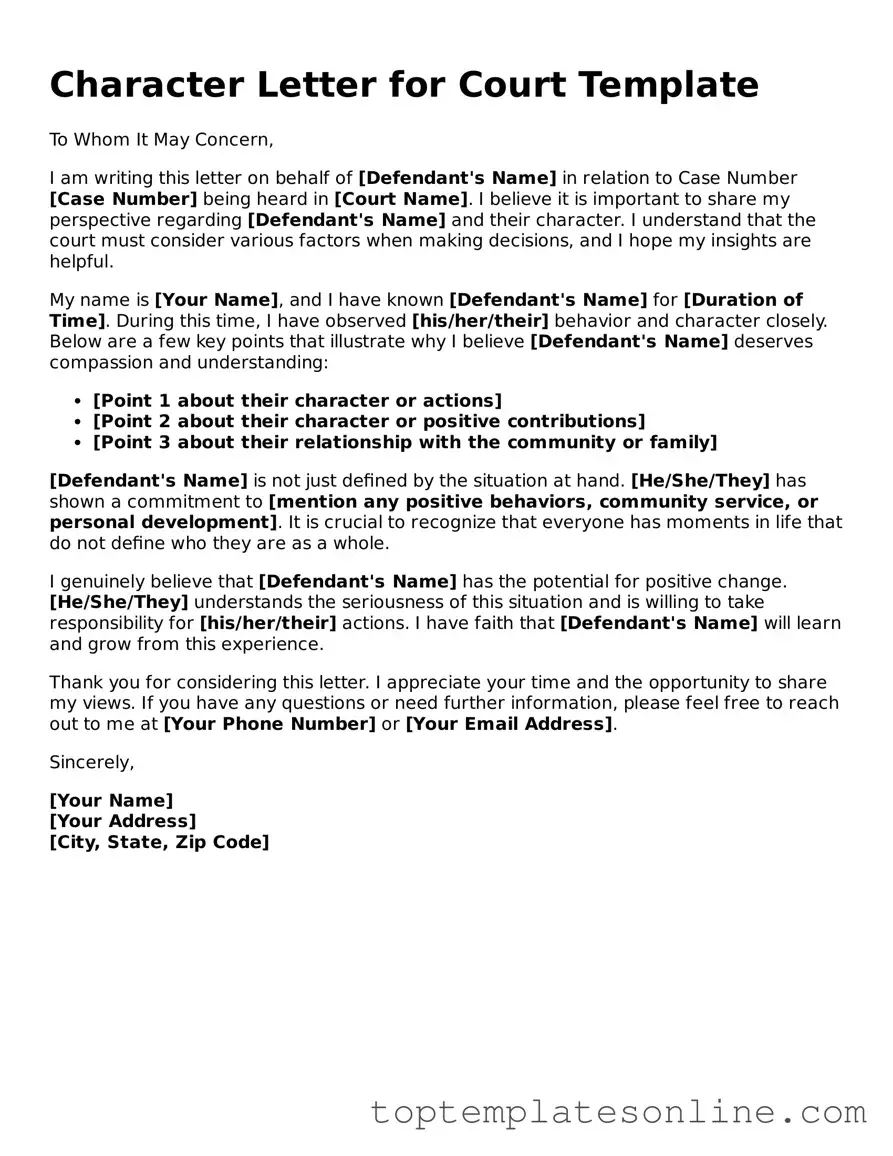Attorney-Approved Character Letter for Court Form
The Character Letter for Court is an important document often submitted in legal proceedings to provide insight into an individual's character and behavior. This letter typically includes personal anecdotes and observations from friends, family, or colleagues, who can attest to the individual's moral standing and integrity. It serves as a way to present a more holistic view of a person beyond the legal issues at hand. The letter usually outlines the writer's relationship with the individual, highlighting positive traits such as honesty, reliability, and responsibility. Additionally, it may address specific incidents that demonstrate the individual's good character, thereby helping the court make informed decisions. Proper formatting and respectful language are essential to ensure the letter is taken seriously by the judge. Overall, the Character Letter for Court can play a significant role in influencing the outcome of a case, making it a valuable tool for defendants and their supporters.
Find More Types of Character Letter for Court Templates
Recommendation Letter Sample for Job - The letter reflects the recommender's relationship with the applicant.
If you are considering supporting a potential new member's journey into fraternity life, it is essential to provide a comprehensive introduction that captures their character and achievements. The Fraternity Recommendation Letter form is designed for this purpose, allowing you to endorse the applicant while offering insights into their personal and academic life. By taking this step, you contribute to building a strong foundation for a new brotherhood member.
Common mistakes
-
Inadequate Personal Information: Failing to provide complete personal details can hinder the letter's effectiveness. Include your full name, address, and relationship to the defendant.
-
Lack of Specific Examples: General statements about the defendant's character are less impactful. Instead, provide specific anecdotes that illustrate their positive traits.
-
Overly Emotional Language: While it is important to convey feelings, excessive emotion can detract from the letter's credibility. Strive for a balance between emotion and objectivity.
-
Ignoring the Court's Purpose: Not aligning the letter with the court's objectives can lead to misunderstandings. Focus on how the defendant's character relates to the case at hand.
-
Neglecting to Proofread: Spelling and grammatical errors can undermine the letter's professionalism. Take the time to review and ensure clarity and correctness.
Guide to Writing Character Letter for Court
Filling out a Character Letter for Court can be a straightforward process. This letter is often used to provide insight into a person's character and background, which can be important during legal proceedings. Following these steps will help ensure that the letter is complete and conveys the necessary information effectively.
- Gather Information: Collect all relevant details about the individual for whom you are writing the letter. This includes their full name, the nature of the legal situation, and any specific points that should be addressed.
- Start with a Greeting: Begin the letter with a respectful salutation, such as "Dear [Judge's Name]” or “To Whom It May Concern.”
- Introduce Yourself: In the opening paragraph, briefly introduce yourself. Include your name, your relationship to the individual, and how long you have known them.
- Provide Character Insights: Use the body of the letter to describe the individual’s character. Share specific examples that illustrate their positive traits, such as honesty, responsibility, or compassion.
- Address the Situation: If appropriate, discuss the circumstances surrounding the legal issue. Explain how the individual has responded to the situation and any efforts they have made for personal growth or restitution.
- Conclude Respectfully: End the letter with a respectful closing statement. Reiterate your support for the individual and express confidence in their character.
- Sign the Letter: Include your signature, printed name, and contact information at the bottom of the letter.
By following these steps, the letter will be well-structured and meaningful, providing the court with valuable insights into the individual's character. Remember to keep the tone respectful and sincere throughout the letter.
Documents used along the form
When preparing for court, a Character Letter for Court can be a vital piece of evidence in demonstrating a person's character. However, it often accompanies other important documents that provide additional context or support. Here are five common forms and documents that may be used alongside a Character Letter:
- Affidavit: This is a written statement confirmed by oath or affirmation, used as evidence in court. It can support the claims made in the Character Letter by providing a sworn account of the individual's character or actions.
- Criminal Background Check: This document outlines an individual's criminal history, if any. It can help the court understand the context of the Character Letter and assess the individual's past behavior.
- Letters of Support: These are additional letters from friends, family, or colleagues that speak to the individual's character. They can reinforce the message of the Character Letter by providing multiple perspectives.
- Character Reference Letter for Child Custody: To support your case with personal insights, consider the informative guide to writing a Character Reference Letter for Child Custody to enhance your presentation in court.
- Personal Statement: A personal statement from the individual in question can provide their own account of the situation and their character. This document can help the court see the individual's perspective and intentions.
- Character References: These are specific references from people who can vouch for the individual's character and integrity. They often carry weight in court as they come from credible sources.
Using these documents in conjunction with a Character Letter can create a more comprehensive picture for the court. Together, they can effectively communicate the individual's character and circumstances, potentially influencing the outcome of the case.
